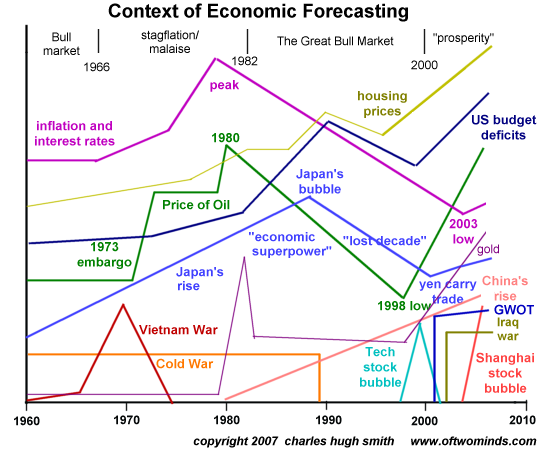

|
| weblog/wEssays archives | home | |
|
A Semi-Long View (June 18, 2007) This Week's Theme: Context Allow me to summarize the economic Optimists and Pessimists core positions: Which is right? Or are both right? This week's theme is Context, for establishing the appropriate context goes a long way toward resolving apparent contradictions. In this sense, problem-solving (and forecasting) boils down to assembling a context which accounts for the known facts and the influences of history, culture and events. One philosophic word for this is "totalization" (from Critique de la Raison Dialectique). By way of an example: consider welfare. Those ideologically against welfare focus on those gaming the system (the scofflaws and cheats), and other deficiencies such as dependency being passed down to the next generation. Those ideologically predisposed to support welfare focus on those impoverished children and mothers whose lives have been improved by welfare, and those who successfully transition from dependency to the workforce. But the larger context of welfare must include its size in the overall Federal Budget (modest) and various technocratic methods/policies to minimize cheating and encourage job skills and entry-level employment of people who were previously "hard-core unemployed." Belief systems may drive politics but they don't provide context or understanding. To establish some basic context for any economic forecast, I've drawn a graphic depiction of some major forces which have influenced the global economy over the past 40 years. 
Note that the lines are not scaled, but they do roughly track trends and key inflection points. What seems rather obvious: Is this an exhaustive "totalization"? Of course not. But as a broad-brush sketch, it does serve a purpose, I think, to set the current "prosperity" in a large context. For more on this subject and a wide array of other topics, please visit my weblog. copyright © 2007 Charles Hugh Smith. All rights reserved in all media. I would be honored if you linked this wEssay to your site, or printed a copy for your own use. |
||
| weblog/wEssays | home |